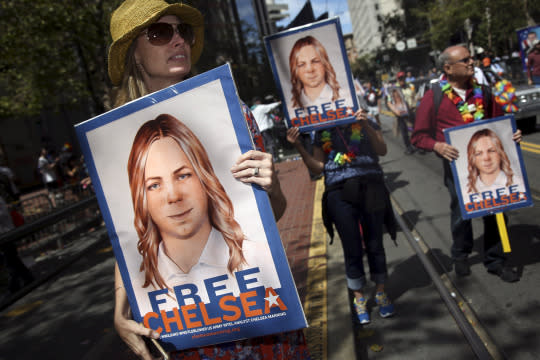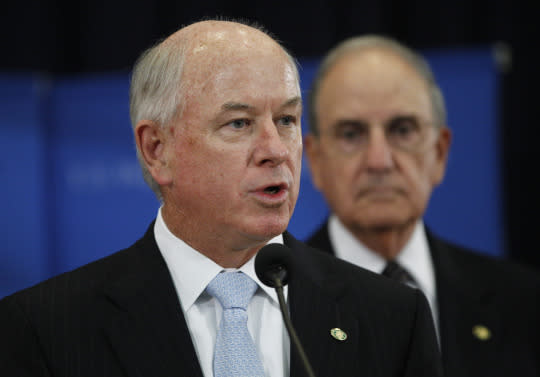Chelsea Manning 'feels like a freak' with 2-inch prison haircut, sues Army

U.S. soldier Bradley Manning (left) leaving a military court facility on July 30, 2013, in Fort Meade, Md., and an undated photo courtesy of the U.S. Army showing Chelsea Manning. (Photo: AFP)
It would be hard to imagine the saga of Chelsea Manning getting any stranger — or more poignant. But it did one night in September when the former U.S. Army intelligence analyst, who is serving a 35-year prison term for leaking hundreds of thousands of classified government documents to WikiLeaks, broke down in tears after authorities at the U.S. Disciplinary Barracks at Fort Leavenworth, Kan., told her she had to cut her hair.
It was the latest in what Manning — who was born a male named Bradley — saw as a cascade of indignities and injustices. Just weeks earlier, she had been temporarily deprived of recreational and library privileges after guards seized unauthorized reading materials (including a copy of Vanity Fair magazine with Caitlyn Jenner on the cover) as well as expired toothpaste in her prison cell.
Only now, as Manning perceived it, the U.S. military was messing with her right to be who she is — a woman — and reinforcing the idea that she is a misfit.
“I felt gross — like Frankenstein’s monster wandering around the countryside avoiding angry mobs with torches and pitchforks,” she wrote in a blog post from prison. Feeling “humiliated, hurt and rejected,” she felt like “giving up” and said she “cried and cried and cried and sniffled a little bit, and then cried some more.”
But Manning, in comments sent from prison to Yahoo News, says she has now overcome her despair and is once again ready to fight the U.S. government in court.
With the help of a premier civil liberties law firm, she is working on an appeal —likely to be filed early next year — of her 2013 conviction for violations of the Espionage Act. She will argue, among other points, that she was in fact a whistleblower who exposed U.S. government abuses and was never given the opportunity to present her motives during her court martial.
Simultaneously, Manning is pursuing a separate lawsuit challenging her treatment in prison. It is a novel case that could pose an awkward dilemma for the Obama administration, which has publicly championed the rights of transgender individuals, including those in prison, yet now stands accused of violating those rights when it comes to the most high-profile transgender inmate in U.S. custody.
In recently filed court papers, Manning, who began receiving hormone therapy at taxpayer expense earlier this year, alleges that prison officials are undermining her treatment for “gender dysphoria,” the medical term used for individuals who feel trapped in the wrong sex, by forcing her to cut her hair to the same 2-inch length as male prisoners, thereby depriving her of her ability to express herself in a “feminine manner.”
“Plaintiff feels like a freak and a weirdo,” Manning asserts in her complaint, “not because having short hair makes a person less of a woman — but because for her, it undermines specifically recommended treatment and sends the message to everyone that she is not a ‘real’ woman.”

Demonstrators hold signs calling for the release of imprisoned WikiLeaks whistleblower Chelsea Manning during a gay pride parade in San Francisco in June. (Photo: Elijah Nouvelage/Reuters)
“Having this taken away is like losing a part of me both physically and emotionally,” Manning told Yahoo News in a statement provided last week through one of her lawyers. “Sometimes I don’t even want to see myself in the mirror.”
Pentagon officials point out that they are already providing Manning not just with hormone therapy (daily doses of estrogen and testosterone blocker) but also with women’s underwear and sports bras — the first time the Defense Department has ever provided such care. Estimated cost of her treatment: between $18,600 and $27,600 over a four-year period. “The military has an obligation to provide for the health care needs of incarcerated inmates,” said U.S. Army spokesman Wayne Hall, emphasizing that for privacy reasons he could not address Manning’s case specifically.
Hall also declined to comment on the underlying claims of Manning’s lawsuit, citing a standing policy of not commenting on pending litigation. But Justice Department lawyers, on the military’s behalf, are due to file a response to Manning’s claims this week, and advocates for transgender rights say they will be watching closely.
“This is a test case,” said Harper Jean Tobin, director of policy for the National Center for Transgender Equality. “The administration and the Justice Department in recent years have taken a very clear and principled position that our civil rights laws protect transgender people.
“It’s a very fair question whether they are applying those principles to Chelsea Manning,” she added. “It shouldn’t matter that she was a leaker. It shouldn’t matter that she is high-profile.”
Manning’s life in prison, as she describes it, might seem at first glance light years removed from the diplomatic and political firestorm she set off five years ago after she was arrested for leaking an unprecedented cache of State Department cables and military war videos, which she had downloaded from a military computer (from a forward operating base outside of Baghdad) onto CDs she labeled as containing Lady Gaga songs.
Now confined in the Army’s highest security prison, where she is the only female among 440 inmates — one of whom is Fort Hood shooter Nidal Hasan — Manning awakens every day at 4:30 a.m., fixes herself in the mirror, eats breakfast and then reports to work at the wood shop by 7 a.m., according to a letter she sent to Yahoo News.
As for later in the day, “I am well known for going to [the] library and law library regularly to do research or type up anything legal or academic that I might be working on.”
It is from there that Manning has managed to maintain her celebrity status — at least among the coterie of activists who continue to view her as a courageous hero who exposed diplomatic double-dealing and military war crimes. One of the videos she leaked shows U.S. soldiers gunning down Iraqi civilians and two Reuters journalists from Apache helicopters. With the help of a public affairs firm (FitzGibbon Media) that specializes in progressive causes, she has started a Twitter account — and now has more than 64,000 followers.
She blogs on a site called the Medium and writes occasional articles for the London-based Guardian, opining on national security affairs and government secrecy. In her latest column this month, Manning argued for abolition of the Foreign Intelligence Surveillance Court — which authorizes secret wiretapping of U.S. terrorist and spy suspects — and then published on her blog a 129-page “surveillance reform” bill that she drafted from prison.
“She has been been made into a caricature. She seems weird to people,” says Trevor FitzGibbon, president of the public affairs firm that handles Manning’s media. “But it’s clear when you speak to her that she is an off-the-charts intelligent person who is conscientious about what she is doing.”

Former State Department spokesman P.J. Crowley speaks as Special Envoy for Middle East Peace George Mitchell looks on at the State Department in Washington in 2010. (Photo: Charles Dharapak/AP)
But not everybody sees Manning as a hero — including some who have at times found the military’s treatment of her clumsy and excessive. P.J. Crowley lost his job as the State Department’s top spokesman in March 2011 after he publicly criticized military authorities for keeping Manning in solitary confinement and forcing her to strip naked at night, calling the treatment “ridiculous and counterproductive and stupid.” The remarks infuriated senior White House officials, who made it clear they wanted Crowley to submit his resignation to Secretary of State Hillary Clinton.
Crowley told Yahoo News in a recent interview that he has never regretted his remarks. “The last thing the United States needed out there is an abuse of a human being in American custody,” he said. “We had gone through that in Abu Ghraib. We had gone through that in Guantanamo. When I was asked a straight question, I gave a straight answer. I have never taken back what I said.”
But Crowley said that still doesn’t make Manning a legitimate whistleblower. “I do understand that she saw some things in Iraq that she viewed as contrary to U.S. law,” he said. “But it’s not up to a private first class in a war zone to determine the policy of the United States of America. That person is there to execute policy. … There were people who were put in harm’s way as a result of those leaks. That’s a fact. I can’t tell you that anyone died. But real people had their lives fundamentally changed.” He mentioned Afghan villagers who were identified in the leaked documents as sources for the U.S. military, who had been “ratting out the Taliban.” (One of Manning’s former supervisors told “60 Minutes” on Sunday that she warned her superiors about Manning’s stability after Manning “punched me in the face and body-slammed me” when she upbraided him for violating Army rules.)
Still, says Crowley, he doesn’t view Manning as a traitor either, just a confused young person “trying to figure out who she was.” He adds: “If the Army was wise, they would grant her parole at the earliest opportunity,” which under her sentence is still at least five years in the future.

